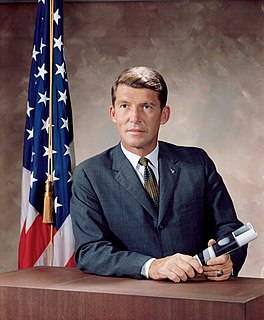A Quote by Dan Quayle
Mars is essentially in the same orbit. Mars is somewhat the same distance from the Sun, which is very important. We have seen pictures where there are canals, we believe, and water.
Related Quotes
They have likewise discovered two lesser stars, or satellites, which revolve around Mars, whereof the innermost is distant from the center of the primary exactly three of his diameters, and the outermost five: the former revolves in the space of ten hours, and the latter in twenty-one and a half, so that the squares of their periodical times are very near in the same proportion with the cubes of their distances from the center of Mars; which evidently shows them to be governed by the same Law of Gravitation that influences the other heavenly bodies.
By 2025 we expect new spacecraft designed for long journeys to allow us to begin the first ever crewed missions beyond the Moon into deep space. So we'll start by sending astronauts to an asteroid for the first time in history. By the mid-2030s I believe we can send humans to orbit Mars and return them safely to Earth. And a landing on Mars will follow and I expect to be around in see it.






























